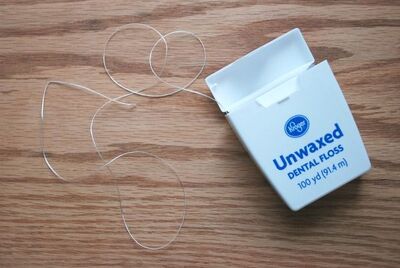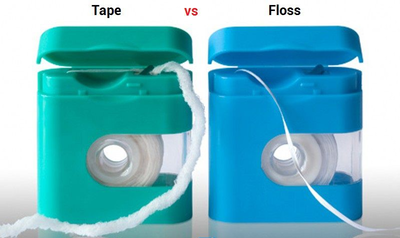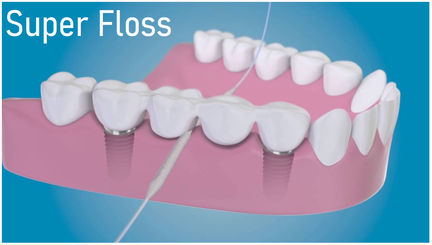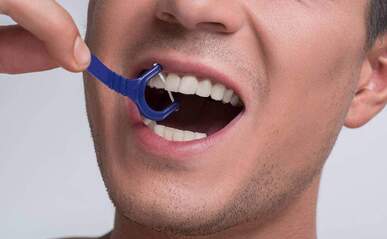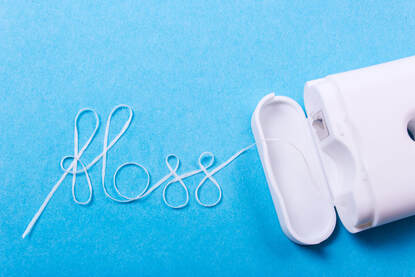Top 5 Reasons Why You Should Floss!
1. PROTECTS YOUR GUMS FROM GUM DISEASE
The plaque that rests on your teeth can cause gum disease. What is plaque? Plaque is (by definition) a sticky layer of bacteria that always forms on your teeth. The bacteria that is in plaque produces acids after you eat or drink anything! These acids can destroy your tooth enamel and cause things like cavities and even gingivitis (gum disease). In other words, the bacteria that is found in plaque causes an inflammatory response that also adds to gum disease. The good news is, flossing helps you to avoid these problems from occurring!
Flossing helps with:
So what does it mean if you are experiencing bleeding gums when flossing? Usually bleeding gums are a sign of poor dental hygiene (which means you are not flossing regularly). The main cause of bleeding gums is the buildup of plaque at your gum line and not flossing regularly will cause the buildup to worsen. This is called gingivitis or inflamed gums. If the plaque is not removed through the process of flossing, then the plaque will harden into tartar. Tarter will actually lead to more bleeding in the gums and a more advanced form of gum and jaw bone disease called periodontitis. What is tarter? Tarter, A.K.A dental calculus, is a yellow or brown coloured deposit that forms when plaque hardens on your teeth. Tarter buildup can only be removed by a professional dental hygienist since tarter is strongly bounded to the tooth enamel.
What should you do to help your gums heal after they bleed? There are a few remedies you can try. For starters, gargle some salt water. Regularly gargling with salt water can help you with removing any bacteria from the gums. Gargling salt water helps clean and prevent more buildup of plaque and tarter from occurring. If the bleeding continues to progress after improved flossing and gargling water, you may want to visit your dental hygienist for a check up.
One of the scary dangers of gum disease is that it also plays a part in the development of heart disease! According to statistical research, you are 20% more likely to develop heart disease if you have gum disease since gum disease spurs on the narrowing of arteries, leading to cardiovascular disease. This is a good reason to want to floss! Flossing helps to ensure that you are not only maintaining a healthy oral hygiene, but also maintaining a healthy you!
Flossing helps with:
- bleeding gums
- receding gums
- tooth and bone loss
So what does it mean if you are experiencing bleeding gums when flossing? Usually bleeding gums are a sign of poor dental hygiene (which means you are not flossing regularly). The main cause of bleeding gums is the buildup of plaque at your gum line and not flossing regularly will cause the buildup to worsen. This is called gingivitis or inflamed gums. If the plaque is not removed through the process of flossing, then the plaque will harden into tartar. Tarter will actually lead to more bleeding in the gums and a more advanced form of gum and jaw bone disease called periodontitis. What is tarter? Tarter, A.K.A dental calculus, is a yellow or brown coloured deposit that forms when plaque hardens on your teeth. Tarter buildup can only be removed by a professional dental hygienist since tarter is strongly bounded to the tooth enamel.
What should you do to help your gums heal after they bleed? There are a few remedies you can try. For starters, gargle some salt water. Regularly gargling with salt water can help you with removing any bacteria from the gums. Gargling salt water helps clean and prevent more buildup of plaque and tarter from occurring. If the bleeding continues to progress after improved flossing and gargling water, you may want to visit your dental hygienist for a check up.
One of the scary dangers of gum disease is that it also plays a part in the development of heart disease! According to statistical research, you are 20% more likely to develop heart disease if you have gum disease since gum disease spurs on the narrowing of arteries, leading to cardiovascular disease. This is a good reason to want to floss! Flossing helps to ensure that you are not only maintaining a healthy oral hygiene, but also maintaining a healthy you!
2. STOPS TOOTH DECAY BETWEEN TEETH
Remember that dreading sound of that dental drill? Who doesn't hate the sound! "Are you flossing regularly" is probably a question that you're asked every time you visit a dental hygienist. This question is frequently asked because, dentists and dental hygienists know that flossing is an essential step in avoiding cavities. Even the tiniest sliver of candy or chocolate caught between two teeth can result in cavity-causing plaque within as little as two days. Plaque can develop under the gums, on the tooth roots, and also break down any bones that support the tooth! In other words, avoid that dental drill! Your dental hygienist knows you enough to know that you don't want to hear the sound of that dental drill! Never mind the feeling of it drilling into your tooth! In order to prevent yourself from getting cavities, it is recommended that you floss at least once a day (after you brush your teeth and usually before you go to bed).
3. IMPROVES APPEARANCE
Do you want to keep that welcoming smile for years to come? Do you maybe want to maintain a long-lasting healthy smile for years into the future? Well, it's time to incorporate regular flossing habits into your daily routine! Regular flossing (once a day after brushing and before bedtime) is the best way to improve the overall brightness of your teeth. Healthy gums plus a bright smile equals the perfect recipe for a beautiful and healthy smile that will surely last you a long while! In other words, floss your teeth often to enhance your beautiful smile and your overall health.
4. FRESHENS YOUR BREATH
We know what you're probably thinking, "shouldn't brushing your teeth twice a day and using mouth wash daily be enough to help freshen your breath?" Flossing is equally as important as brushing your teeth and should be a part of your daily oral care routine. Don't you love that feeling of waking up with a fresh smelling breath that already gives you a boost in your morning? Not only does your breath smell better, but knowing that your breath is clean and fresh also helps you to feel better. Flossing is an instant boost in confidence because now you're ready to start your morning clean and fresh! Keep that confident vibe alive by flossing away the trapped little food from dinner, so you can wake up feeling fresh and brand new. A comprehensive oral care routine will guarantee a fresh breath.
5. IMPROVES YOUR OVERALL HEALTH
Don't only floss for your teeth, floss for your overall health and well-being! Even though brushing your teeth after each meal doesn't seem very convenient, flossing is! Flossing after each meal is way easier and it can be done anywhere! You can floss after every meal to eliminate build up from occurring at all! Not only does regular flossing help you to practice good oral hygiene, but it also helps you to maintain a healthy lifestyle.
Colleen Mclean, the dental hygienist, recommends that you floss once a day (minimum), the best time being evenings after you have already brushed your teeth to remove any food and plaque at the end of the day. If you have noticed any changes to your teeth (for example, you notice that a particular tooth has become sensitive as a result of little to no flossing), please book an appointment to see your dental hygienist.
Colleen Mclean, the dental hygienist, recommends that you floss once a day (minimum), the best time being evenings after you have already brushed your teeth to remove any food and plaque at the end of the day. If you have noticed any changes to your teeth (for example, you notice that a particular tooth has become sensitive as a result of little to no flossing), please book an appointment to see your dental hygienist.
Our Top 5 Best Types of Dental Floss
1. Waxed Floss
Waxed floss has a thin layer of wax on its surface, which makes it a little thicker than unwaxed floss, but much easier for you to glide between the teeth.
Pros: waxed floss is usually flavoured and allows for a smooth flossing experience because of its convenient wax layer. The different flavours on this wax floss can help keep your breath fresh after each flossing session. This floss can be used for everyone! However, we find that patients with tightly spaced teeth may find it easier to use waxed floss due to its natural lubricating property. Waxed floss is usually much stronger than unwaxed floss (mostly because it won't break as much during flossing because of its extra layer of wax).
Cons: because the wax floss is a bit thicker than the unwaxed floss, waxed floss is a bit harder to fit into tighter gaps. It may also be harder to grip because of its waxy texture and may be unpleasant to some.
Is this floss right for you? Yes! The dental hygienist highly recommends this product since this type of floss works for anyone! Individuals with tighter gaps may find it a bit harder to fit the floss into their teeth at first, but after a while, the natural lubricating property makes it much easier to glide between teeth and does its job properly. We highly recommend that those with tighter gaps use this floss during their everyday oral hygiene routine in order to get used to this floss.
Pros: waxed floss is usually flavoured and allows for a smooth flossing experience because of its convenient wax layer. The different flavours on this wax floss can help keep your breath fresh after each flossing session. This floss can be used for everyone! However, we find that patients with tightly spaced teeth may find it easier to use waxed floss due to its natural lubricating property. Waxed floss is usually much stronger than unwaxed floss (mostly because it won't break as much during flossing because of its extra layer of wax).
Cons: because the wax floss is a bit thicker than the unwaxed floss, waxed floss is a bit harder to fit into tighter gaps. It may also be harder to grip because of its waxy texture and may be unpleasant to some.
Is this floss right for you? Yes! The dental hygienist highly recommends this product since this type of floss works for anyone! Individuals with tighter gaps may find it a bit harder to fit the floss into their teeth at first, but after a while, the natural lubricating property makes it much easier to glide between teeth and does its job properly. We highly recommend that those with tighter gaps use this floss during their everyday oral hygiene routine in order to get used to this floss.
2. Un-waxed Floss
Unwaxed floss, is thinner and way more comfortable to move in and out of your teeth. Waxed floss is a standard nylon floss that only has a very small layer or wax on it.
Pros: unwaxed floss can be used for anyone! It is usually free from artificial flavours (which means your mouth will be exposed to fewer chemicals). It's lack of a wax coating makes it much easier to get in between tighter spaces (so teeth that are close together).
Cons: unwaxed floss usually does not come flavoured and is prone to shredding or breaking during flossing.
Is this floss right for you? Yes! The dental hygienist highly recommends this product since this floss works for anyone! Individuals with tighter gaps may find this floss to be much easier to use than the waxed floss. We highly recommend that those with tighter gaps and larger gaps use this floss during their everyday oral hygiene routine.
Pros: unwaxed floss can be used for anyone! It is usually free from artificial flavours (which means your mouth will be exposed to fewer chemicals). It's lack of a wax coating makes it much easier to get in between tighter spaces (so teeth that are close together).
Cons: unwaxed floss usually does not come flavoured and is prone to shredding or breaking during flossing.
Is this floss right for you? Yes! The dental hygienist highly recommends this product since this floss works for anyone! Individuals with tighter gaps may find this floss to be much easier to use than the waxed floss. We highly recommend that those with tighter gaps and larger gaps use this floss during their everyday oral hygiene routine.
3. Satin Tape or Dental Tape
Satin Tape is made of a silky ribbon-like floss that wraps around your fingers and slides between teeth and below the gum line. The dental hygienist recommends the Oral-B Satin Tape 2-layered design.
Dental Tape is a much more broader and flatter type of floss than a standard floss. Dental floss comes in waxed or unwaxed kinds. Dental tape is recommend for people with more space between their teeth since this floss helps make the experience of flossing more comfortable compared to standard floss.
Pros: This kind of tape effectively removes plaque and food particles to help you prevent cavities and gum problems from occurring. Dental tape is recommend for people with more space between their teeth since this floss helps make the experience of flossing more comfortable compared to standard floss.
Cons: Dental tape does not fit very well around crowded teeth.
Is this floss right for you? Well, if you have crowded teeth, then this kind of floss will make flossing much more difficult and uncomfortable for you. So, those with spaces between their teeth will be a great candidate for this kind of floss!
Dental Tape is a much more broader and flatter type of floss than a standard floss. Dental floss comes in waxed or unwaxed kinds. Dental tape is recommend for people with more space between their teeth since this floss helps make the experience of flossing more comfortable compared to standard floss.
Pros: This kind of tape effectively removes plaque and food particles to help you prevent cavities and gum problems from occurring. Dental tape is recommend for people with more space between their teeth since this floss helps make the experience of flossing more comfortable compared to standard floss.
Cons: Dental tape does not fit very well around crowded teeth.
Is this floss right for you? Well, if you have crowded teeth, then this kind of floss will make flossing much more difficult and uncomfortable for you. So, those with spaces between their teeth will be a great candidate for this kind of floss!
4. Super Floss
Super floss is similar to a standard floss on both ends, but it has a thicker, more fluffier section to it in the middle. This really thick floss is meant for those with large gaps between their teeth or for those with dental appliances (for example, bridges or braces). The ends of the super floss are usually stiff to help with threading it between teeth or under bridgework.
Pros: This super floss effectively removes plaque and food particles to help you prevent cavities and gum problems from occurring. The super floss is recommend for people with large space between their teeth since this floss helps make the experience of flossing more comfortable compared to standard floss.
Cons: Super floss does not fit very well around crowded teeth since the thick and fluffier section in the middle part of this floss will make the experience of flossing even more painful for those individuals.
Is this floss right for you? If you have crowded teeth, then this kind of floss will make flossing very painful for you. So, those with dental appliances or large spaces between their teeth will be a great candidate for this kind of floss!
Pros: This super floss effectively removes plaque and food particles to help you prevent cavities and gum problems from occurring. The super floss is recommend for people with large space between their teeth since this floss helps make the experience of flossing more comfortable compared to standard floss.
Cons: Super floss does not fit very well around crowded teeth since the thick and fluffier section in the middle part of this floss will make the experience of flossing even more painful for those individuals.
Is this floss right for you? If you have crowded teeth, then this kind of floss will make flossing very painful for you. So, those with dental appliances or large spaces between their teeth will be a great candidate for this kind of floss!
5. Floss Picks or Floss Holder
Dental floss picks are small plastic little cleaning tools with a curved end that holds a piece of dental floss. The other end of floss picks have a small plastic pick that can be used instead of a wooden toothpick to remove large food particles that can get caught along the gum line or between teeth.
Floss holders are E-shaped or even Y-shaped little cleaning tools that have a small piece of dental floss between two prongs at one end.
Pros: This kind of floss is much easier to use for those with limited dexterity. The dental hygienist recommends that you floss with a tooth pick to help you get used to flossing, but is not recommended for every-day use.
Cons: the dental hygienist does not recommend using these two kinds of floss all of the time as the small section of floss is unable to wrap around a tooth properly. Unlike the other kinds of floss, a floss pick or floss holder limits you since you are unable to use a fresh section of floss between each set of teeth (which could transfer bacteria from one part of your mouth to another).
Is this floss right for you? If you are a beginner, the floss pick is a great way to start as it will assist you in practising how to carefully floss between each tooth. However, you will want to eventually start flossing with a a waxed or un-waxed kind of floss as floss picks or floss holders are not recommended for every day use.
Floss holders are E-shaped or even Y-shaped little cleaning tools that have a small piece of dental floss between two prongs at one end.
Pros: This kind of floss is much easier to use for those with limited dexterity. The dental hygienist recommends that you floss with a tooth pick to help you get used to flossing, but is not recommended for every-day use.
Cons: the dental hygienist does not recommend using these two kinds of floss all of the time as the small section of floss is unable to wrap around a tooth properly. Unlike the other kinds of floss, a floss pick or floss holder limits you since you are unable to use a fresh section of floss between each set of teeth (which could transfer bacteria from one part of your mouth to another).
Is this floss right for you? If you are a beginner, the floss pick is a great way to start as it will assist you in practising how to carefully floss between each tooth. However, you will want to eventually start flossing with a a waxed or un-waxed kind of floss as floss picks or floss holders are not recommended for every day use.
5 Tips to Help You Improve Your Flossing Routine
1. Pick a Good Quality Floss
The best kind of floss for you is one that you are most likely to use daily. There are, however, some guidelines that can help you to determine a floss that is right for you based on the space between your teeth, the dexterity in your hands, and so on. We have listed our top 5 best kinds of floss that you should use above. If you need some help choosing which floss is right for you, fill out our survey below and we will provide you with the kind of floss we believe you should use. We will also send you a list of the best brands of floss that is best for you based on your results in the survey.
2. Floss Every Night
Yes, flossing every 24 hours is ideal! If you find that it is more convenient for you to floss your teeth every morning than at night, then by all means floss whenever you're able to! It is, however, recommended that you floss before bed since removing food particles and other debris just before you go to bed helps to kill harmful bacteria from causing damage to your oral health overnight.
3. Floss After You Brush Your Teeth
Just like flossing at night, if flossing before you brush your teeth is more convenient for you, then by all means floss whenever you are able to. It is recommended that you floss after you brush your teeth since the floss will pick up leftover debris that your toothbrush might miss! No matter whether you floss before or after brushing, the most important thing is that you do it!
4. Rub Against Teeth, Don't Saw
The #1 common flossing mistake is sliding the floss between two teeth and then aggressively "sawing" up and down or back and forth on the gums. This way of flossing can be very harmful to the gums and also fails to remove the food particles and other debris that may be caught on the sides of the teeth.
Follow these 4 steps to floss properly:
Follow these 4 steps to floss properly:
- Gently slide the floss between the teeth
- Wrap the floss around the base of the tooth into a "C" shape
- While maintaining the "C" shape, slide the floss from the base of the tooth up to its tip. Repeat this process two or three times
- Repeat this entire process for the other tooth
5. Never Reuse Floss
Yes, it is always good to reduce, reuse, and recycle. However, you are better off throwing away your floss after using it since reusing floss re-introduces the bacteria and debris that the floss removed from your teeth in the first place. Not only should you always use a new strip of floss every time you floss, but you should also use a new section of the length of loss as you work your way through your mouth while you floss every time.
Implementing all of these five strategies will guarantee that your flossing routine will truly be effective. This will surely give you better odds of enjoying maintaining your oral health for years to come.
Implementing all of these five strategies will guarantee that your flossing routine will truly be effective. This will surely give you better odds of enjoying maintaining your oral health for years to come.
SUBSCRIBE TO OUR NEWSLETTER!Sign up for our newsletter and receive monthly emails with helpful oral health tips, new deals, and news!
|
|



